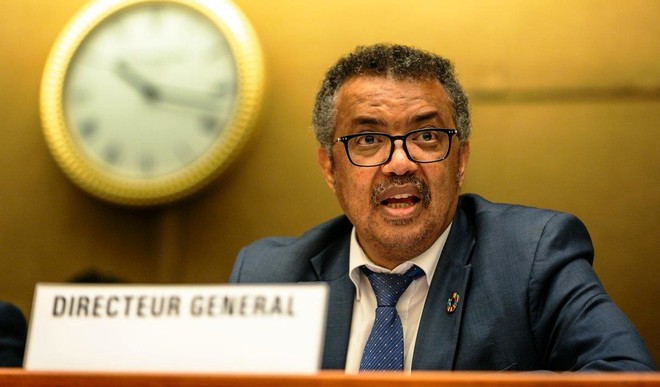No UHC without quality, equity, dignity – WHO DG
The Director-General of the World Health Organisation, Dr. Tedros Adhanom Ghebreyesus has said there can be no Universal Health Coverage without quality, equity, dignity (QED) and sexual and reproductive health rights. Dr. Tedros who was speaking at the ongoing 71st World Health Assembly session on ‘Why women, children, adolescents and youth are central to advancing […]


The Director-General of the World Health Organisation, Dr. Tedros Adhanom Ghebreyesus has said there can be no Universal Health Coverage without quality, equity, dignity (QED) and sexual and reproductive health rights.
Dr. Tedros who was speaking at the ongoing 71st World Health Assembly session on ‘Why women, children, adolescents and youth are central to advancing UHC, QED and SRHR’, said, “The foundation of universal coverage is on stronger systems based on people centred primary care.
“It is not just the provision of services that matter. It is the quality of those services provided that are also vital and important. There is no Universal Health Coverage without quality care. Improving the quality of care is a challenge for all countries and all the systems.”
While emphasising the need for health services to be inclusive of the populace benefitting from them, the WHO boss said, “People centred care means ensuring that the services are tailored to people’s needs and are provided in partnership with them rather than simply given to them. They are especially relevant for women children and adolescents. Over the past decade we have made strides in reducing maternal and prenatal mortality by increasing access to skilled birth attendants.”
In spite of efforts made across board to reduce complications for mothers and their babies, Dr. Tedros noted that, “many women and their babies die or suffer from lifelong disabilities due to poor care practices even after reaching a health facility.
“The lack of access to sexual and reproductive services, like family planning are unacceptable. Twenty-five million unsafe abortion occur every single year. Enhancing the quality care requires the engagement of all stakeholders in the design and delivery of services.”
Against this backdrop, he noted that quality doesn’t only apply at the bedside. “It applies to all levels of the health system – planning, procurement, accountability, monitoring and so on. Making quality part of the culture for health system can reduce hospital admission rates, including the timeliness and reception of care and decrease inefficiencies.
For the WHO DG, “achieving that culture requires articulated national strategies based on the realities of implementation at the frontline. Many countries are using maternal, newborn, child and adolescent health as the pathfinder for advancing efforts on quality.”
Reiterating the WHO’s readiness to support such setups, Dr. Tedros who had in his keynote address, at the opening of the Assembly said there is no commodity in the world more precious than health, stressed that, an organization charged with defending the health of seven billion people bears great responsibility and must be held to high standards.
The DG who referred to a camp for internally displaced person he visited during a recent trip to Borno State, in Nigeria’s north-east to the Democratic Republic of Congo as a result of the Ebola outbreak, stressed the need for urgent response to tackling the global health challenges because every moment lost hinges on life or death.
Commending the resilience and doggedness of the WHO staff and health workers who regardless of their challenges have stayed true to the oath of their professions, he said, “The most powerful reminders of that responsibility in the past year have been the people I’ve met all over the world whose health we work to protect.”
Although he expressed worry over the Ebola crisis in the DRC, and its spread to an urban centre, he was however optimistic that the WHO was is much better placed to deal with this outbreak than it was in 2014.
He said, “I’m pleased to say that vaccination is starting as we speak. Unfortunately, the health minister of DRC cannot be with us today, but I hope he will be able to join us tomorrow. I am proud of the way the whole Organization has responded to this outbreak, at headquarters, the regional office and the country office. I particularly want to thank our partners, MSF, the World Food Programme, the Red Cross and many others who have responded quickly.”
As a need to respond to such emergencies with a sense of urgency, a High-Level Commission on Noncommunicable Diseases, to stop the premature and preventable deaths of millions of people was set up by the WHO.
In line with this and to respond to other related situations he said, “It’s why we established an initiative on climate change in small island developing states, to defend the health of people who cannot defend themselves against a world that is changing around them.”
The WHO in this regard is also working with the Stop TB Partnership, the Global Fund and civil society to find and treat all four million people globally who are infected with tuberculosis and don’t know it. It is also working on an aggressive new initiative to jumpstart progress against malaria, an entirely treatable disease that still kills half a million people every year and has launched a call to action to eliminate cervical cancer, a disease for which we have all the ingredients for success.
The Organisation has also launched a new initiative to eliminate trans-fats from the global food supply by 2023 which led to the fast tracking of the development of the 13th General Programme of Work.
